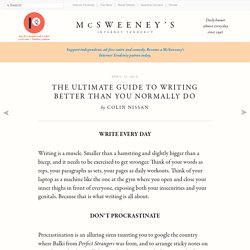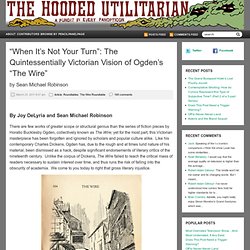

5 Writing Exercises That Will Make You More Creative. An Example: ... will mean nothing to you here, because it would be a tangential spin-off of a supporting character from a project that you don't know even know that I'm working on.

That's like four different ways for you to not give a shit, so let's just fill this space with a man trying to kill the ground with an explosive sledgehammer. Do try to not look disappointed. Thomas Northcut/Photodisc/Getty Are you sick of dealing with your project? Don't worry, there's an easy fix: Just steal somebody else's work! Remember: They can only prosecute if you try to use it. "Whatever," RoboCop said, "I didn't want to come here anyway. " "That's a great attitude," Officer Lewis snapped. "I wanted to stay home and watch TV! " "Well, you can't, OK?
"What?! " "I guess you won't," Officer Lewis answered coolly. RoboCop heaved a defeated sigh and, rolling his eyes, put fifty 9mm rounds into Boddicker's gut. How to Write a Sincere First Draft of Your Science Fiction or Fantasy Epic. I don't understand how those last three things you should avoid need to be avoided in the first place.

I understand why they are bad, but how could anyone fall victim to these things? Cliches: unavoidable in general, and you would need but a handful of minutes on TVTropes to find that something you're writing has already become a trope. But no sane person would purposefully write cliches in earnest. Pulling punches: what's the point of writing something if you are avoiding conflict? I enjoy conflict and I think it feels great in real life and fiction. Fake sentiment: is there even time for it? Having an overarching concept and believable characters and just watching what happens is, to me, a great way to be sincere.
I find that asking people about the concepts (like, "What would you do if... ") is useful. Conceptual Fiction. The Dead Do Not Improve: An Author Cannibalizes His Own Novel. The Ultimate Guide to Writing Better Than You Normally Do. Writing is a muscle.

Smaller than a hamstring and slightly bigger than a bicep, and it needs to be exercised to get stronger. Think of your words as reps, your paragraphs as sets, your pages as daily workouts. Think of your laptop as a machine like the one at the gym where you open and close your inner thighs in front of everyone, exposing both your insecurities and your genitals. Because that is what writing is all about. Procrastination is an alluring siren taunting you to google the country where Balki from Perfect Strangers was from, and to arrange sticky notes on your dog in the shape of hilarious dog shorts. The blank white page. Mark Twain once said, “Show, don’t tell.” Finding a really good muse these days isn’t easy, so plan on going through quite a few before landing on a winner.
There are two things more difficult than writing. Are literary classics obsolete? - Writers and Writing. You have only to look at the one-star reviews given to classic novels on Amazon.com to recognize that quite a few contemporary readers find these immortal works of literature unreadable.

Stories that don’t begin with a Hollywood-style bang or that skimp on action are dismissed as “boring.” Subtleties of character and context are overlooked. But more than anything else, the one-star brigade hates the prose of the past. Any writer whose sentences contain multiple clauses typically gets labeled “wordy” or “flowery” (a term that only seems to be used by people who don’t know what it means). Surely only ignoramuses and resentful students slogging through their required reading feel this way, right? If it strikes you as peculiar to see numbers guys (the article’s authors are all men) weighing in on literary style, then you haven’t been keeping up with the latest developments in humanities research. English has no academy, and Swift was both right and wrong. Further reading. “When It’s Not Your Turn”: The Quintessentially Victorian Vision of Ogden’s “The Wire” There are few works of greater scope or structural genius than the series of fiction pieces by Horatio Bucklesby Ogden, collectively known as The Wire; yet for the most part, this Victorian masterpiece has been forgotten and ignored by scholars and popular culture alike.

Like his contemporary Charles Dickens, Ogden has, due to the rough and at times lurid nature of his material, been dismissed as a hack, despite significant endorsements of literary critics of the nineteenth century. Unlike the corpus of Dickens, The Wire failed to reach the critical mass of readers necessary to sustain interest over time, and thus runs the risk of falling into the obscurity of academia. We come to you today to right that gross literary injustice. The Wire began syndication in 1846, and was published in 60 installments over the course of six years.
Each installment was 30 pages, featuring covers and illustrations by Baxter “Bubz” Black, and selling for one shilling each. The Wire charted another course. Just Released From the BBC: A Rare 1968 Interview with J.R.R. Tolkien (VIDEO)